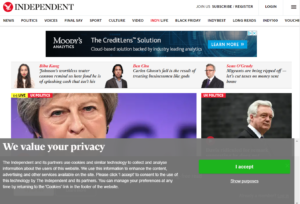As a marketer, I am painfully aware of all of the schemes that some companies carry out in order to get as much data on consumers as possible, some of them ethical and others not so much. In the United States, these schemes are well hidden. One such example is banks getting information on possible targets from universities in order to grow their consumer base. Banks realize that as soon as students leave the school setting, they will enter the “real world”. As a result, they will no longer be relying on their parents and will have to take control of their financial situation. To do so, they will need financial services such as credit cards and mortgages. Given that these consumers are college educated, they will likely have a high paying job, which makes them low-risk consumers in the eyes of the banks. Additionally, banks target students because they know that the best time to target potential customers is when they are changing their habits, i.e. when students move out of the university paradigm in favor of the independent living paradigm. So, every year, banks buy contact information for juniors in colleges in order to target them with promotional materials, without any explicit consent from the students.
In Europe, it’s a slightly different story. Due to the increased concern for and support of consumer protections, governments restrict companies on the amount of information that they can gather on consumers on their own websites. Unlike in the US where companies can gather any information they want on their visitors (excepting uniquely identifiable information, of course), in Europe, you are allowed to modify the type of information that you want a website to collect on you.
Some websites, like Independent UK, force you to choose your cookie preference before you can proceed to the website by having an obnoxiously large banner at the bottom of the screen (see screenshot below). This method is great because it requires the users to give explicit consent on the information that they would like the company to collect on them. This also ensures that all users are aware of the option to limit the data collection and can additionally instill trust in the company by positioning itself as a transparent organization.
Other websites, like La Voix du Nord for example collect as much cookies as possible on you by default and include a small, barely visible banner at the bottom of the screen. But if you are aware of this option and look at the band at the bottom of the screen, you can modify the cookies that will be collected from your web surfing. When you click on modify the cookies collected, you get the option to stop almost all cookie collection (see screenshot below). Companies try to keep you from doing so (to collect the most amount of data) by reminding you that your ads will not be personalized as a result of disabling the cookies.
Regardless of the method, the great thing is that consumers are given the right to choose. The important part is being aware of this feature. Is this data collection flexibility introduced or required in your country? Do you give access to all, some, or none of your browsing data to companies?


Way cool! Some extremely valid points! I appreciate you penning this
post plus the rest of the website is also really good.